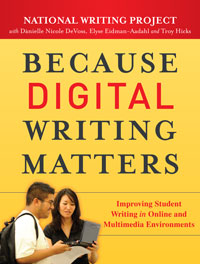Author: National Writing Project, with Dànielle Nicole DeVoss, Elyse Eidman-Aadahl, and Troy Hicks
Summary: What does it mean to write digitally? What does it mean to be a teacher of writing in a digital age? In this introduction to the book, Because Digital Writing Matters, the authors provide an overview in response to these questions. They address historical perspectives on writing, expanding definitions of digital writing, and the impact of the integration of technology on the teaching and learning of writing. In addition, they explore what digital writing might look like in classrooms, including a discussion of the new media literacy tools, strategies, skills, and dispositions that are necessary to operate within our expanding participatory culture. This chapter and related resources may be especially useful for study groups, as well as those planning professional development or developing grant proposals focused on digital literacy.
Original Date of Publication: 2010
Excerpt:
Rather than attempt to cover the long human history of meaning making, however, for the purposes of Because Digital Writing Matters, we define digital writing as compositions created with, and oftentimes for reading or viewing on, a computer or other device that is connected to the Internet. This in itself is a transformation in the ways in which we write. The bigger transformation is, however, the networked ways in which we can share, distribute, and archive digital compositions using Internet based technologies. Today’s network connectivity allows writers to draw from myriad sources, use a range of media, craft various types of compositions representing a range of tools and genres, and distribute that work almost instantaneously and sometimes globally. Michael Crawford, one of Chris Joseph’s interviewees (2005), summed up the new possibilities of digital writing well: “I like to think of it as a totally new place…where one can experience freedom of form and from the boundaries now imposed.” And for Alison Clifford, “The most positive aspect of digital writing has come from the need to re-think writing and how stories are told. Digital writing requires us to think of multiple possibilities and interpretations of events throughout the narrative and perhaps it encourages a more comprehensive way of thinking about the story as a result.”
Related Resources
- The Impact of Digital Tools on Student Writing and How Writing is Taught in Schools
- Because Digital Writing Matters: A Conversation with the Authors
- The Landscape of Digital Writing
Original Source: National Writing Project, https://www.nwp.org/cs/public/print/books/digitalwritingmatters
